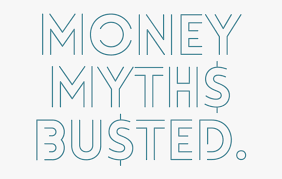With every other person ready to give financial advice, it is now next to impossible to figure out which is the right advice to follow. To top that, money management is the most easily available subject in most finance-related blogs and websites. With such a vast amount of information floating around, we thought it was about time that we busted a number of money myths that almost each one of us has come across at some point or the other in our lives. Read on to know the truth behind seven such money myths…
[toc]-
Myth 1: A credit card is a problematic financial product
A credit card can be quite a valuable tool if it is used effectively. However, if used ineffectively, it can lead to a world of harmful consequences. Credit cards are and can remain a substantiated source of finance, provided you maintain a healthy relationship with it. Credit cards in UAE are a necessity in many ways. They score over debit cards because of the reward points as well as the ease of conducting transactions even during a financial crunch. Therefore, it is always advisable to understand your card’s fee structure, rewards, interest rates, and penalties. Also, make sure that you do your research well and compare various cards to determine the best one for yourself and your lifestyle. There are a number of banks providing credit cards in UAE with offers for various specific activities such as dining, shopping, and traveling. Make sure you are well aware of your lifestyle as well as spending habits and opt for a card that best compliments them.
-
Myth 2: Investments are for the rich, the rest only save money
Saving money and investing it are two different things, but equally important. Putting money into a savings account or money market account keeps it liquid but you won’t see as much growth in interest as you would by investing in the stock market instead. In terms of investment vehicles, stock funds historically have almost always exceeded other investments over periods of ten years or more. But, don’t just park your money in a fund or two and leave it. Review the performance of the funds at least annually, and make adjustments as necessary for under-performing funds. A financial planner can not only provide advice on your savings plan but can also manage and monitor investment performance and send quarterly statements. If you are managing your own investments, be sure to account for the time that you have left to invest.
Read More:- 3 Brilliant Methods To Improve Your Credit Score With Loans
-
Myth 3: Retirement planning can wait
No matter how much you want to keep working for your entire life, it is no excuse to not save for retirement. Having that money handy prepares you in case you retire earlier than anticipated. It is important to realize that you may indeed experience financial hardships in the future. People are often optimistic about their financial future, living with the faith that things will be better in the years to come, but it’s not something you can bank on. It is important to realize the importance of retirement planning and start developing your retirement plan. You’ll put yourself in the best situation if you start planning for retirement early on. Accumulating the funds you need for a comfortable retirement may take decades, depending on your income, and you’ll want as large of a nest egg as possible when you are no longer bringing in a salary. By starting to invest in your retirement early on in your career, your funds will accumulate and grow over time, leaving you with a substantial enough fund to fulfil your retirement dreams.
-
Myth 4: Budgeting is not important if you can manage your expenses
Budgeting is one of the most important tools in the arsenal of someone planning to save money for the future. It allows you to approach the huge future costs efficiently by planning and saving for it over the years. With a good budget, you can avoid unnecessary expenses and ensure that you save enough to be financially prepared for planned and unplanned expenses in the future. By creating a budget, you can also keep your debts in check. Budgeting is neither about being able to manage your expenses nor about releasing funds for investing. Budgeting is about rationalizing your expenses.
Read More:- A Good Credit Score Is Good Financial Health. True or False?
-
Myth 5: Past performance of an investment instrument can be used to know its potential to generate good returns
This is the most widely accepted myth of those in this list. A majority of people often turn to the past performance of a stock investment or a mutual fund or any other such instrument when they are trying to plan their investments. Thus, they base their decision on the assumption that is a certain investment instrument has performed well in the past, it has a higher potential of generating good returns in the future as well, forgetting that this is something that cannot be predicted. While the historical performance can help you understand how the instrument has performed during a certain market condition, it cannot predict future performance. It is extremely important to understand the fundamentals of investing and those of the particular stock or mutual fund before you make a decision to invest.
-
Myth 6: Equity investments can be associated with high risks
Stock investments are often believed to be appropriate only for those who have a high-risk tolerance. Yes, the high-risk definition does make sense when stocks are compared with bonds or other debt instruments. However, at the same time, there are also many large-cap or blue-chip stocks that are not as risky as they seem. They are, in fact, quite safe and have a better potential for growth as compared to various fixed-income options. Every investment, including bonds and other debt instruments, is bound to have an associated risk. Keep in mind that the key lies in buying stocks of those companies that have strong fundamentals because even low-risk investments do not come with an assurance that you are completely safe.
Read More:- A Beginner’s Guide To Personal Loans in UAE
-
Myth 7: A credit card can be used as an emergency fund
An emergency fund can help you ride out disruption to your income without going deep into debt by putting living expenses on credit cards or taking out loans. By contrast, when you use credit cards as your emergency fund, the money you spend becomes credit card debt that you’ll eventually have to repay. If your future self does not have the extra income to handle the debt, you may find yourself under a crushing debt load. Moreover, using a credit card for emergency spending not only produces debt6+ but also makes you pay for the privilege of having that debt. Most credit cards charge double-digit interest rates, making it even harder to pay down the balance. Also, keep in mind that if you max out your credit card to cope with a catastrophe, you can expect your credit scores to drop substantially. That is because you would have significantly increased your credit utilization ratio, which is the amount you owe as a percentage of your credit limit.
Among many others, these are the most common myths in the field of money management and finances. Make sure that before you believe any money-related suggestion, you think about whether it applies to your situation. We hope that these truths make it easier for you to deal with varying financial myths that come your way.
Original Post Date : Jul 5, 2020 , Updated on : Oct 28, 2020

